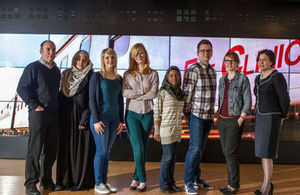UK students to volunteer on South Africa’s ‘train of hope’
Glasgow Caledonian University Vision Sciences students to volunteer on South Africa’s ‘train of hope’

Students from from GCU’s Vision Sciences Department
Thirty two Glasgow Caledonian University students are travelling to South Africa this summer to volunteer on Phelophepa, a custom-built ‘train of hope’ that delivers primary health care to remote areas of the country.
The optometry students from GCU’s Vision Sciences department in the School of Health and Life Sciences will join a team of full-time professionals in the train’s eye clinic.
During a two-week placement, the student volunteers will carry out eye examinations and give eye-care advice to children and adults from the country’s neediest communities.
Helen Brown, Associate Dean International of the School of Health and Life Sciences, said: “The School of Health and Life Sciences is delighted to be involved in an initial five-year strategic partnership with the Phelophepa initiative. This volunteering project will give our students a unique international opportunity and invaluable experience of working with communities as they work with up to 100 patients every day, supported by local translators and clinical staff.
“Over the next five years, we will seek to support the project further through the provision of nursing and psychology students as clinical volunteers.
“Our support for Phelophepa further embeds GCU’s social mission ‘For the Common Good’ and demonstrates our commitment to develop students to be global citizens.”
On the 20th anniversary of democracy in South Africa, the students will travel to the country in groups of four to six between July and September. Gemma Hill, a third year BSc Optometry student, is among the first group of students to board the train. She said: “I’m looking forward to increasing my optometry skills and putting everything I’ve learnt over the last three years into practice.
“Every week the train moves to a different location and as it pulls in to a station hundreds of people are waiting to be seen. They are queuing for health care that we take for granted in Scotland. For example, a simple solution like a pair of glasses can change their lives; it can allow them to read the blackboard clearly at school for the first time or allow them to find work to support their family.
“The Phelophepa train really is an amazing initiative and I’m so proud to be a part of it.”
PhelophenaTrain
In many South African rural communities, there is often only a single doctor for every 5000 people. Launched in 1994, Phelophepa uses the existing rail networks to make quality medical care an accessible reality for many of South Africa’s most remote communities. As well as the eye clinic, the Phelophepa train consists of another five on-board operations: a health clinic, pharmacy, dental clinic, psychology clinic and educational clinic.
In 2012, a second mobile healthcare train, Phelophepa II, was launched to bring healthcare to an even greater number of patients. With both trains operating simultaneously, they each travel over 117,000 miles and see an average of over 45,000 patients a year. Both trains are owned and operated by Transnet – South Africa’s largest freight rail company. Head of the Transnet Foundation, Cynthia Mgijima, said: “By forging public-private partnerships, we are able to combine our skills, assets and resources with those of other organisations to optimise outputs that could not have been achieved by working in isolation.
“Our long-standing partnerships, and the new ones we continuously forge, have helped to bring primary healthcare to millions of South Africans, and we are very proud of the positive impact this initiative has had on people’s lives. It is through such public-private partnerships that we believe we can have the most profound and sustainable impact on healthcare”.
This is the first time students from a UK institution have volunteered on the trains and marks an important development in the University’s strategic partnership with Transnet. Fiona Stewart-Knight, Director of Business Academies at GCU, said: “The University has a long-standing relationship with Transnet. Our Scottish Centre for Work Based Learning has designed, in partnership with the Institution of Railway Operators, a BSc in Railway Operations Management and is now delivering this programme to more than 1000 Transnet staff in South Africa.
“I have long held the ambition to link GCU’s excellence in healthcare and social mission with the inspirational Phelophepa project. This is an unparalleled opportunity for GCU students and staff to bear witness to the challenges of primary healthcare delivery in South Africa and to be part of an alternative and inspirational solution.”